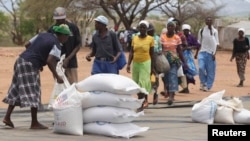HARARE —
The World Food Program says it is very concerned about food security as Zimbabwe enters the peak of its so-called hunger season -- the last three months before the traditional harvest. The U.N. agency is experiencing a shortage of funding to avert hunger in the southern African nation where about two million people need food assistance.
In a statement on Tuesday, the WFP said the food security situation in rural areas was dire with four provinces - Matabeleland North and South, Masvingo and Midlands - particularly vulnerable as they receive far less rains than other provinces.
The agency's ability to avert starvation is being hindered by its budget. Despite generous contributions from donors such as the United States, Britain, Canada, Japan, Australia, the European Union and the U.N.’s Central Emergency Relief Fund, the WFP says it is still short of the $60 million it needs to fully implement its relief and recovery operations in Zimbabwe in the next six months by importing food - mainly maize.
In 2013, Zimbabwe produced 800,000 tons of corn, down from the more than 2 million tons it was producing over a decade ago. The U.N. Food and Agriculture Organization estimates Zimbabwe needs about 2 million tons of corn for livestock feed and human consumption.
To meet help that gap, Zimbabwe announced this month that it will be importing 150,000 tons of corn from neighboring South Africa. But that won’t be enough. This week, Sydney Mhishi, a senior official in the ministry of social welfare, told parliament he needs more funds.
“The critical period is now. We are in January and February and early March," Mhishi said. "The amount l have been given for this whole year can only purchase a quarter for the requirement of January, not to talk about February not to talk about March. I am assuming there will be good rains coming after May up to December next year," he said.
For more than a decade, food shortages have loomed over Zimbabwe. Agricultural production plunged in the early 2000s. Authorities attribute that to drought, while critics say it was President Robert Mugabe’s chaotic land reforms. Since then, maize, Zimbabwe’s staple crop, has been in short supply.
In a statement on Tuesday, the WFP said the food security situation in rural areas was dire with four provinces - Matabeleland North and South, Masvingo and Midlands - particularly vulnerable as they receive far less rains than other provinces.
The agency's ability to avert starvation is being hindered by its budget. Despite generous contributions from donors such as the United States, Britain, Canada, Japan, Australia, the European Union and the U.N.’s Central Emergency Relief Fund, the WFP says it is still short of the $60 million it needs to fully implement its relief and recovery operations in Zimbabwe in the next six months by importing food - mainly maize.
In 2013, Zimbabwe produced 800,000 tons of corn, down from the more than 2 million tons it was producing over a decade ago. The U.N. Food and Agriculture Organization estimates Zimbabwe needs about 2 million tons of corn for livestock feed and human consumption.
To meet help that gap, Zimbabwe announced this month that it will be importing 150,000 tons of corn from neighboring South Africa. But that won’t be enough. This week, Sydney Mhishi, a senior official in the ministry of social welfare, told parliament he needs more funds.
“The critical period is now. We are in January and February and early March," Mhishi said. "The amount l have been given for this whole year can only purchase a quarter for the requirement of January, not to talk about February not to talk about March. I am assuming there will be good rains coming after May up to December next year," he said.
For more than a decade, food shortages have loomed over Zimbabwe. Agricultural production plunged in the early 2000s. Authorities attribute that to drought, while critics say it was President Robert Mugabe’s chaotic land reforms. Since then, maize, Zimbabwe’s staple crop, has been in short supply.




